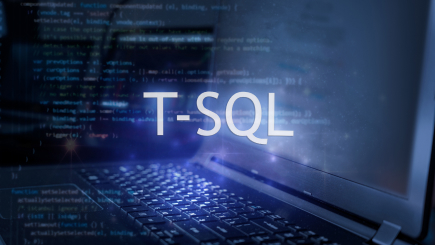
Learn T-SQL with online courses and programs
Are you a Microsoft SQL programmer ready to take the next steps in database management? Learn T-SQL with online courses delivered through edX.

What is Transact-SQL (T-SQL)?
T-SQL, short for Transact-SQL, is a powerful extension of the SQL (Structured Query Language) used in Microsoft SQL Server and Sybase ASE databases. It combines standard SQL's data querying and manipulation capabilities with additional features for procedural programming. T-SQL introduces variables, control-of-flow statements, error handling, and more, enabling the creation of complex logic within SQL scripts.
One of its key strengths is the ability to develop stored procedures, user-defined functions, triggers, and views, allowing for efficient data management and encapsulation of reusable logic. It also offers support for transactions to ensure data integrity and consistency. T-SQL plays a vital role in the Microsoft SQL Server ecosystem, serving as the primary language for interacting with and manipulating data in SQL Server databases. Database administrators, developers, and data analysts rely on T-SQL to perform a wide range of tasks, from querying and updating data to implementing automation.1
Browse online T-SQL courses
Related Topics
T-SQL course curriculum
Online T-SQL courses can cover a comprehensive curriculum designed to teach learners the fundamentals and advanced concepts of Transact-SQL for working with Microsoft SQL Server databases. The curriculum may vary depending on the course's level (beginner, intermediate, advanced), but key topics you may encounter include:
- Introduction to SQL and T-SQL: Study the basics of SQL and its importance in database management, as well as an overview of T-SQL and its role in Microsoft SQL Server.
- Database fundamentals: Learn about relational databases, tables, and data types.
- Data querying: Practice writing statements to retrieve data from tables, filtering data using clauses, sorting and grouping data, and joining multiple tables.
- Data modification: Gain experience inserting, updating, and deleting records, and managing transactions.
- T-SQL programming constructs: Learn aboutdeclaring and using variables, conditional logic with statements, looping, and iterative constructs with loops.
- Stored procedures: Develop skills bycreating and executing stored procedures, passing parameters to procedures, and managing input/output parameters and return values.
Learning about how to use T-SQL can supplement your knowledge of database management and system administration. edX offers a variety of educational opportunities for learners interested in studying these topics, as well as a host of other disciplines. A boot camp can provide flexible hands-on learning for those who want to upskill quickly, while executive education courses are designed for busy professionals. You can also pursue a more comprehensive curriculum in a bachelor’s degree program or, for more advanced learners, a master’s degree program. Find the right learning path for you.
Explore T-SQL jobs
A course in T-SQL can potentially open doors to a variety of job opportunities in the field of database management and SQL Server development. Jobs that individuals with T-SQL skills might pursue include:
- Database administrator (DBA): Manages and maintains databases, ensuring their integrity, security, and performance. They use T-SQL to create and optimize database structures, write stored procedures, and troubleshoot issues.
- SQL Server developer: Develops applications that interact with SQL server databases. They write T-SQL code to retrieve and manipulate data within applications.
- Database analyst: Queries and analyzes data, extracts insights, and creates reports. They work with business users to understand data requirements and deliver actionable insights.
- Database engineer: Designs and builds data pipelines to ingest, transform, and store data. They use T-SQL for data integration and to create data transformation processes.
- Database tester: Verifies the accuracy and performance of database systems by writing T-SQL queries and conducting thorough testing.
- SQL Server administrator: Manages and maintains SQL server instances, including installation, configuration, and security. They use T-SQL for administrative tasks.
These roles showcase the versatility of T-SQL skills in various positions. Depending on the specific role and organization, T-SQL professionals may also focus on tasks related to database design, and reporting. Are you ready to further your career with T-SQL? Build the skills you need with online courses delivered through edX.
More opportunities for you to learn
We've added 500+ learning opportunities to create one of the world's most comprehensive free-to-degree online learning platforms.
Learn SQL Tutorial. (2023). T-SQL. Retrieved September 22, 2023.